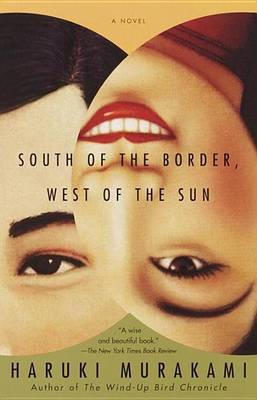Reviewed by empressbrooke on
Murakami uses a mix of MPDGs and what I consider his version of their flip side, Depressed Pixie Dream Girls. They're all eccentric and just too cute and unusual for their own good, and for some reason they all adore the completely dopey, lifeless blank slates that are Murakami's protagonists, but Murakami's depressed versions are melodramatically tragic and suicidal instead of bubbly.
These women can often be spotted by the lack of their own story, and Shimamoto exhibits that perfectly in South of the Border, West of the Sun. She's mysterious, with a secret past and a dead baby and expensive clothes despite never having worked a day in her life. But do we ever discover anything about her? Does she have a story, or is she merely punctuating the main character's life with her presence? The only thing that was really driving me forward through the book was wanting to find out what her deal was, and all we find out is that she might really be a Pixie Dream Girl.
Also, she can put her mouth around the main character's balls while laying her head on his navel, which is proof that either she really is a dream girl or else the translator had a bit of a hiccup here.
Aside from that trope, Murakami pulled out another duo that I hate hate hate with a passion - grown man mooning over his girlfriend from his teen years, and people falling in love despite not knowing each other. These often go hand in hand, as the grown man will be in love with someone who is now also grown when he runs into her again, and yet he only knows who she was when she was 15. I can't stand it in John Cusack movies, and I really couldn't stand it here. The 37-year-old main character has never stopped thinking about the girl he last saw when they were 12, even though he's gotten married and had kids. It's presented as romantic and nostalgic and everything except the creepy immaturity it really is. And he admits to her when they meet as adults that he loves her even though he doesn't know anything about her except what she was like as a 12-year-old. It elicited the same reaction from me that Casablanca did when the main characters swore to never speak of their pasts and yet drooled declarations of love all over each other. If you love someone despite not knowing them, all you're really doing is loving yourself reflected in their eyes. Blech.
Somehow this little 200-page book has elicited a review longer than most 500-page books get out of me, so I'll stop pissing off film lovers now and go wonder if the remaining Murakami books I have yet to read will meander from this MPDG, teenage-days nostalgia, or if they'll at least make it more fun like [b:The Wind-Up Bird Chronicle|11275|The Wind-Up Bird Chronicle|Haruki Murakami|http://photo.goodreads.com/books/1166468418s/11275.jpg|2531376] did.
Reading updates
- Started reading
- 4 June, 2010: Finished reading
- 4 June, 2010: Reviewed
